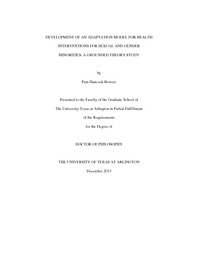
ATTENTION: The works hosted here are being migrated to a new repository that will consolidate resources, improve discoverability, and better show UTA's research impact on the global community. We will update authors as the migration progresses. Please see MavMatrix for more information.
Show simple item record
| dc.contributor.author | Bowers, Pamela Hancock | en_US |
| dc.date.accessioned | 2014-03-12T23:53:17Z | |
| dc.date.available | 2014-03-12T23:53:17Z | |
| dc.date.issued | 2014-03-12 | |
| dc.date.submitted | January 2013 | en_US |
| dc.identifier.other | DISS-12409 | en_US |
| dc.identifier.uri | http://hdl.handle.net/10106/24171 | |
| dc.description.abstract | A dearth of literature exists on health issues impacting sexual and gender minority (SGM) populations. SGM face health disparities linked to stigma, discrimination, and denial of their civil and human rights. Albeit limited in scope and depth, available data suggests sexual orientation and gender identity have been an important demographic factor associated with higher risk for several negative health outcomes such as cancer, cardiovascular disease, and stroke. Some of the major inequities affecting SGM include tobacco use, alcohol and illicit drug abuse, being overweight/obese, psychiatric disorders, and violence. The SGM who face health disparities created by the use of various substances, overeating, and violence, have required researchers, community partners, and other relevant entities to identify culturally relevant practices and approaches to diminish these inequities.My dissertation research investigated how various health interventions have been culturally adapted to fit the needs of SGM. The purpose of this study was to develop an adaptation model through the examination of the targeted modifications that researchers, community partners and others make to existing interventions. Heretofore, explorative studies with the specific intent to build an adaptation model of this type for SGM have not been conducted. The theoretical lens supporting this research included social constructivist grounded theory and queer curriculum theory. Data were collected from interviews with key informants who identified as researchers and community partners involved in cultural adaptation projects for SGM. The final results from the data are presented in two ways: (1) in a diagram that depicts the central phenomena, which I call the emergent model (2) and a narration of the diagram which examined the details of the model. A semi-structured interview and qualitative analysis using grounded theory revealed three main themes (cultural considerations, adaptation process, and lessons learned) and a process model. The results of my research are intended to provide a more accessible and relevant route to intervention adaptations relevant to SGM. Implications for social work practice, policy, and research are presented. | en_US |
| dc.description.sponsorship | Bricout, John | en_US |
| dc.language.iso | en | en_US |
| dc.publisher | Social Work | en_US |
| dc.title | Development Of An Adaptation Model For Health Interventions For Sexual And Gender Minorities: A Grounded Theory Study | en_US |
| dc.type | Ph.D. | en_US |
| dc.contributor.committeeChair | Bricout, John | en_US |
| dc.degree.department | Social Work | en_US |
| dc.degree.discipline | Social Work | en_US |
| dc.degree.grantor | University of Texas at Arlington | en_US |
| dc.degree.level | doctoral | en_US |
| dc.degree.name | Ph.D. | en_US |
Files in this item
- Name:
- Bowers_uta_2502D_12409.pdf
- Size:
- 1.492Mb
- Format:
- PDF
This item appears in the following Collection(s)
Show simple item record


